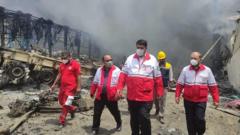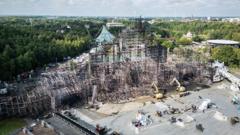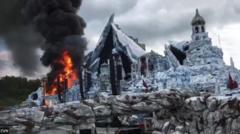**A tragic explosion at one of Iran's largest ports has left many dead and injured, stirring public outrage and calls for accountability.**
**Anger Rises After Deadly Explosion at Iran's Shahid Rajaee Port**

**Anger Rises After Deadly Explosion at Iran's Shahid Rajaee Port**
**Fatal blast prompts national mourning and sharp criticism of government handling of hazardous materials**
In Iran, a sense of grief has quickly morphed into anger following a massive explosion at the Shahid Rajaee port that has resulted in the deaths of at least 40 individuals and injured over 1,000 others. The blast, which occurred early Saturday morning, sent thick plumes of black smoke into the air and sparked widespread emergency responses, with citizens flocking to hospitals to volunteer blood donations.
As reports indicate that toxic fires continue to blaze, health officials have urged residents in affected areas to stay indoors and don protective clothing. The nearby city of Bandar Abbas, which hosts the country’s navy's main base, has shuttered schools and offices to concentrate on managing the aftermath of the disaster. A local festival that was meant to be a celebration turned somber as attendees paid tribute to the victims.
Amid national mourning declared for Monday, with further observances scheduled in Hormozgan province, questions regarding the safety protocols at the port have arisen. Residents have begun to voice concerns over the storage of hazardous materials alleged to have been linked to the explosion, with reports suggesting the incident stemmed from improper handling of solid fuel meant for ballistic missiles.
Ambrey Intelligence, a risk consultancy, pointed out that the fires visible before the explosion might have been connected to inadequate measures taken regarding shipments of dangerous materials. Speculation on social media has suggested that the military and the Islamic Revolutionary Guard could have improperly stored rocket fuel from a recent shipment, a claim denied by military spokespersons.
In response to the unrest, Iranian President Masoud Pezeshkian visited the site of the explosion, stating that an investigation had been initiated to ascertain the cause. Meanwhile, the defense ministry denied the existence of any military cargo in the area, but the questions surrounding safety protocols have continued to provoke public outrage regarding governmental oversight.
The economic implications of this incident have also stirred concerns, considering that Shahid Rajaee port handles approximately 80% of Iran's imports. Initial warnings of potential food shortages were later downplayed by authorities, who clarified that the majority of port operations remain unaffected. Meanwhile, firefighting efforts have been mobilized with assistance from international partners, including offers of support from Russia and condolences from various nations.
As Iranian and US officials engage in negotiations over Tehran's nuclear program, the timing of the tragedy has fueled speculation and heightened scrutiny towards the state’s management of such crises. The government is now tasked with addressing the grievances of the public while navigating the complicated implications of the blast on both national safety and economic stability.
As reports indicate that toxic fires continue to blaze, health officials have urged residents in affected areas to stay indoors and don protective clothing. The nearby city of Bandar Abbas, which hosts the country’s navy's main base, has shuttered schools and offices to concentrate on managing the aftermath of the disaster. A local festival that was meant to be a celebration turned somber as attendees paid tribute to the victims.
Amid national mourning declared for Monday, with further observances scheduled in Hormozgan province, questions regarding the safety protocols at the port have arisen. Residents have begun to voice concerns over the storage of hazardous materials alleged to have been linked to the explosion, with reports suggesting the incident stemmed from improper handling of solid fuel meant for ballistic missiles.
Ambrey Intelligence, a risk consultancy, pointed out that the fires visible before the explosion might have been connected to inadequate measures taken regarding shipments of dangerous materials. Speculation on social media has suggested that the military and the Islamic Revolutionary Guard could have improperly stored rocket fuel from a recent shipment, a claim denied by military spokespersons.
In response to the unrest, Iranian President Masoud Pezeshkian visited the site of the explosion, stating that an investigation had been initiated to ascertain the cause. Meanwhile, the defense ministry denied the existence of any military cargo in the area, but the questions surrounding safety protocols have continued to provoke public outrage regarding governmental oversight.
The economic implications of this incident have also stirred concerns, considering that Shahid Rajaee port handles approximately 80% of Iran's imports. Initial warnings of potential food shortages were later downplayed by authorities, who clarified that the majority of port operations remain unaffected. Meanwhile, firefighting efforts have been mobilized with assistance from international partners, including offers of support from Russia and condolences from various nations.
As Iranian and US officials engage in negotiations over Tehran's nuclear program, the timing of the tragedy has fueled speculation and heightened scrutiny towards the state’s management of such crises. The government is now tasked with addressing the grievances of the public while navigating the complicated implications of the blast on both national safety and economic stability.






















